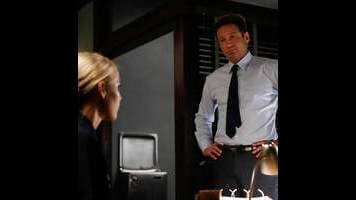Aquarius: “Everybody’s Been Burned”/“The Hunter Gets Captured By The Game”

Pre-season reviews of Aquarius have offered a mixed bag so far. Many reviewers, like our own Noel Murray, have noted that it tries to offer too many options at once: a hard-boiled detective show, a case-of-the-week, and a depiction of the pre-Helter Skelter days of the Manson Family. Aquarius succeeds at some of these efforts (the former) more than others (the latter), but is mostly well-done enough to keep us hooked from week to week.
The first episode succeeds more than its second, as a young couple attends a happening party to the tune of ominous hippie music and is quickly drawn into a dangerous world. Young Emma (Bunheads’ Emma Dumont) decides to stick around, so we get to see how an outsider would view their induction into Manson’s universe. Even down to the most basic levels, like how people with no means of support would get clothing (shoplifting) or food (dumpster diving). Game Of Thrones’ Gethin Anthony portrays the cult leader as more of a heartbreaker than the sociopath we’ve seen recently (in Jeremy Davies’ TV-movie version, for example), and the script uses examples from Manson’s own life, like the time his mother sold him to a waitress in a bar. It’s hard to believe that this character was so charismatic to have almost-perfect strangers completely bend to his will, but that’s why hoards of people follow some people around, I guess. I had to guffaw at episode two’s final twist, though, that even Emma’s square politician dad is into Manson. Did not see that one coming. One one hand, it explains why her father would keep quiet in 1967 about the maniac his teenage daughter is shacked up with; on the other, dude, the guy cut your neck with a razor. What’s romantic about that?
Manson (along with post-Summer-Of-Love events like Altamont) has come to represent the dark side of the hippie movement, creating a mystery as to how a group of people who preached so much peace and love could be led around by someone so delusional and homicidal. Aquarius’ time on the Manson ranch may veer into a sociopathic soap, but it also points out what made Manson so appealing for runaways like Emma. It was a disturbing time. Although flappers rebelled in the 1920s and rock’n’roll inspired a youth movement in the ’50s, none of these came close to rejecting society outright like the hippies of the late ’60s, a group who had lost faith in the things they were supposed to believe in, like their parents, or God, or the government, or their country that was drafting its young men into what was considered an unjust war. These anchorless youth needed something to hold on, which is what drew them to false leaders like Manson, and, a little later, Sun Myung Moon, and David Koresh, who broke everything down for them into the simplest terms. Members of these group no longer had to think anymore in a confusing time, just follow.
Someone like Detective Hodiak, commandingly played by David Duchovny, wouldn’t understand the appeal of any of this. A straight-laced, hard-hitting detective, much more Scully than Mulder, he’s so out of touch he has to corral a hippie whisperer (Grey Damon as Brian Shafe) to be the bridge in his own personal generation gap. Duchovny is surprisingly effective as a hard-boiled gumshoe, the type that sticks out at a hippie party like a sore thumb and would rather knee a suspect in the groin than read him those pesky new Miranda rights. Hodiak’s softer side is spotted as he tries to track down an old flame’s daughter (speculating that these two hook up in three, two…) and grapples with his alcoholic almost ex-wife and AWOL son.

 Keep scrolling for more great stories from A.V. Club.
Keep scrolling for more great stories from A.V. Club.